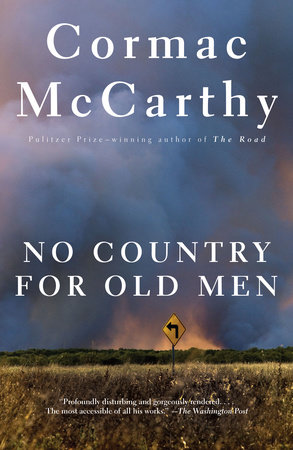No Country for Old Men Reader’s Guide
By Cormac McCarthy


1. The title of the novel comes from William Butler Yeats’s poem “Sailing to Byzantium”: “That is no country for old men, the young / In one another’s arms, birds in the trees, / —Those dying generations—at their song.” The poem also contains the lines: “An aged man is but a paltry thing, / A tattered coat upon a stick, / Unless soul clap its hands and sing, and louder sing / For every tatter in its mortal dress.” Why has McCarthy chosen a line from Yeats’ poem for his title? In what ways is No Country for Old Men about aging? Does Sheriff Bell experience any kind of spiritual rejuvenation as he ages?
2. McCarthy has a distinctive prose style—pared down, direct, colloquial—and he relies on terse, clipped dialogue rather than narrative exposition to move his story along. Why is this style so powerful and so well-suited to the story he tells in No Country for Old Men?
3. Early in the novel, after Bell surveys the carnage in the desert, he tells Lamar: “I just have this feelin we’re looking at something we really aint never even seen before” [p. 46]. In what way is the violence Sheriff Bell encounters different than what has come before? Is Anton Chigurh a new kind of killer? Is he a “true and living prophet of destruction,” [p. 4] as Bell thinks? In what ways does he challenge Bell’s worldview and values?
4. After Llewelyn finds the money and comes home, he decides to go back to the scene of the crime. He tells his wife: “I’m fixin to go do somethin dumbern hell but I’m goin anways” [p. 24]. Why does he go back, even though he knows it is a foolish and dangerous thing to do? What are the consequences of this decision?
5. When asked about the rise in crime in his county, Bell says that “It starts when you begin to overlook bad manners. Any time you quit hearin Sir and Mam the end is pretty much in sight” [p. 304]. Is he right about this? Why would deteriorating manners signal a larger social chaos?
6. How can Anton Chigurh’s behavior be explained? What motivates him to kill so methodically and heartlessly? How does he regard the people he kills?
7. Llewellyn tells the young woman he picks up hitchhiking: “Things happen to you they happen. They don’t ask first. They dont require your permission” [p. 220]. Have things simply happened to Llewellyn or does he play a more active role in his fate? Does his life in fact seem fated?
8. What motivates Sheriff Bell? Why does he feel so protective of Llewellyn and his wife? In what ways does Sheriff Bell’s past, particularly his war experience, affect his actions in the present?
9. McCarthy will often tell the reader that one of his characters is “thinking things over” without revealing what the character is thinking about [see p. 107]. Most novelists describe in great detail what their characters are thinking and feeling. Why does McCarthy choose not to do this? What does he gain by leaving such information out?
10. Sheriff Bell says, “The stories gets passed on and the truth gets passed over. . . . Which I reckon some would take as meanin the truth cant compete. But I don’t believe that. I think that when the lies are all told and forgot the truth will be there yet. . . . You cant corrupt it any more than you can salt salt” [p. 123]. What incorruptible truths emerge from the story that McCarthy tells in No Country for Old Men?
11. In the italicized sections of the novel, Sheriff Bell reflects on what he feels is the moral decline and growing violence of the world around him. What is the moral code that Bell lives by? What are his strongest beliefs? How has he acquired these beliefs?
12. Jeffery Lent, writing in The Washington Post Book World, described No Country for Old Men as “profoundly disturbing” [“Blood Money,” The Washington Post Book World, July 17, 2005]. What is it about the story that McCarthy tells and the way he tells it that is so unsettling?
13. Near the end of the novel, Bell says: “I think we are all of us ill prepared for what is to come and I dont care what shape it takes” [p. 295]. What kind of future is Bell imagining? Why does he think we are not ready for it? How can No Country for Old Men be understood as an apocalyptic novel?
Just for joining you’ll get personalized recommendations on your dashboard daily and features only for members.
Find Out More Join Now Sign In